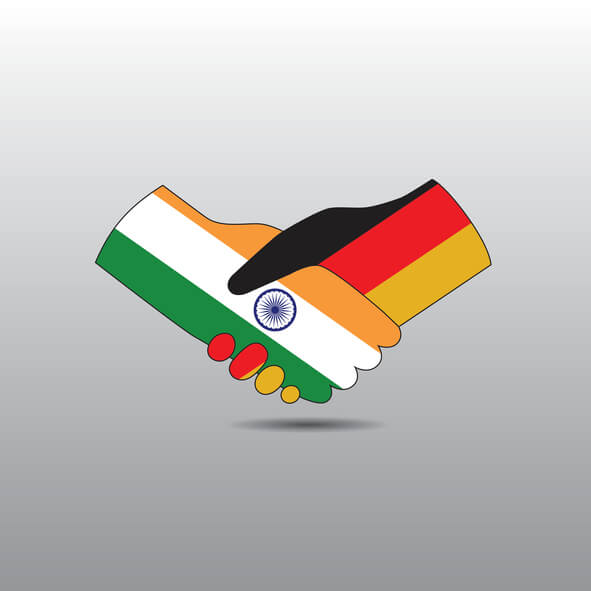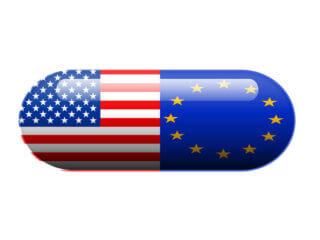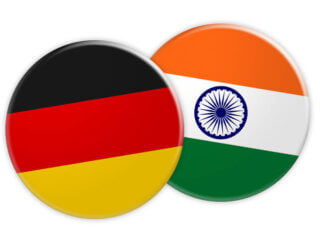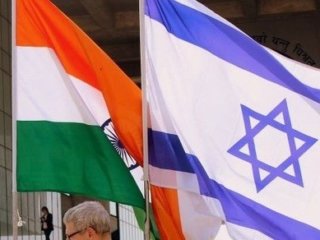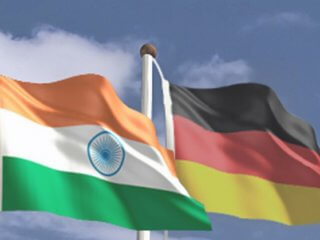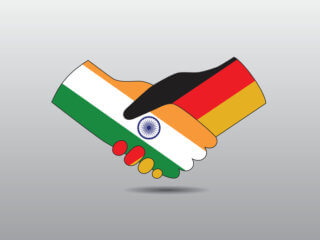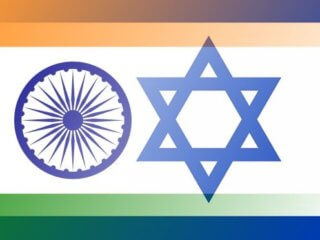Indian healthcare space has tremendous investment potential. To cater the needs of 1.26 billion citizens, India would need an additional 7 lakh physicians and qualified medical professionals by 2022. India is known for its high-quality medical values, and a large number of Indian doctors are practicing in other countries. Medical tourism in the country is estimated to grow up to US $10 Billion by 2020. Hence private players and institutions are encouraged to set-up medical hospitals and schools respectively. Top companies are also invited to invest from initiatives like Digital India, Make in India and Startup India. The potential for India-Germany collaboration is immense.
India-Germany collaboration opportunity
India is important to partner for Germany in Asia and Germany is the largest trade partner for India in the European Union. India and Germany Medical Cooperation date back to five decades. However, extensive and intense collaboration has evolved over last 30 years.
Healthcare specialists command high respect in Indian society, and many youths aspire to become doctors, highlighting the tremendous demand for healthcare hospitals, companies, and institutes. There is an existent gap in some physicians to satisfy the healthcare needs of the country. India also has a rich source of alternate health remedies like AYUSH (Ayurveda, Yoga, Unnani, Siddha, and Homeopathy). The government of India has also encouraged Public Private Partnership model.
Indian Healthcare sector has significant potential profit in next five to seven years. The government has taken various steps like Single window clearance, start-up loans (through Start-up India), 100% FDI to improve ease of doing business in the country. Germany is significantly investing through foreign direct investment (FDI) into the country, and healthcare sector presents an exciting opportunity for current and new stakeholders.
| Recommended for you | |
| 300 Innovative digital health startups in Germany | |
| 26 Key people in digital health India and their profiles | |
| Digital health market in Germany over next 10 years |
India-Germany collaboration overview
- India-Germany Intergovernmental Consultations (IGC):
Strategic Partnership between India and Germany developed in 2000, and it further strengthened with the Intergovernmental Consultations (IGC) between the two governments. The intergovernmental consultation allows a comprehensive review of cooperation in existing areas and a platform to recognize new areas of engagement. India is amongst a select group of countries with whom Germany has such a dialogue mechanism. The 4th IGC was held in Berlin on 30th May 2017 during PM Modi’s recent visit to Germany. In bilateral delegation-level talks chaired by PM Modi and Chancellor Angela Merkel, two leaders inked twelve memoranda of understanding (MoUs) and agreements. These agreements aimed at enhancing the strategic partnership between the two countries in the areas of trade and investment, health and alternative medicine, security and counter-terrorism, innovation and science and technology, skill development, urban development, clean energy, railways, and development cooperation. Prime Minister Modi said, “German proficiencies fit well with my vision for India’s transformation.”Contacts
Embassy of India, Tiergartenstr.17 10785 Berlin, Germany
Telephone: +49 30-257950
- Make in India Mittelstand (MIIM): The MIIM program is a unique investment facilitation program launched in September 2015 by the Embassy of India in Berlin to facilitate investments by German Mittelstand companies. The program is implemented not only with the government officials but also by engaging key industry partners who support the businesses in various aspects of market entry into India. The objective of this program is to support fund availability for German companies opting to invest in Indian projects. MIIM program is implemented and supervised by Indian Embassy in Berlin with the assistance of Department of Industrial Policy & Promotion (DIPP) and Ministry of External Affairs, Government of India. It is monitored on a quarterly basis by the Indian Ambassador to Germany, H. E. Gurjit Singh along with delegates of partner ministries and institutions. MIIM is a unique program aimed at presenting a one-stop solution for German companies requiring market entry support services. Participating companies will get the additional benefits of individual workshops, information exchange, networking, etc. The program offers a broad range of business support services under a single platform. Services consist of strategy consulting, financial services, operational market entry support, tax & legal provisions, project financing, location services, technology collaboration, facilitation of consents from central & state authorities and access to government agencies. MIIM Program has an all in one network of MIIM Program Partners to support the participating companies with their services. Best-in-class partners selected after complete due diligence. It is another landmark in “Ease of Doing Business” in India. MIIM aimed at making the market entry of Mittelstand companies as a smooth process. As of March 2017, MIIM is facilitating an investment of Euro 650 million and generating employment opportunities in India of about 4000. Currently, the program supporting 72 German SMEs in their market entry into India and out of those 41 are already in advanced stage of their investment. Sectors covered include Chemicals, Renewable Energy, Consumer Goods, Environment, Infrastructure, and Mobility. The Government of Germany has acclaimed the Make in India Mittelstand (MIIM) program of the Indian Embassy in Berlin as an excellent initiative towards the overall Indo-German Business relations.
Contacts
Germany
Email: [email protected]
Telephone: +49 30 25795514
India
Department of Industrial Policy & Promotion, Udyog Bhawan, New Delhi 110011
Telephone: +91 011-23061222
- Indo-German S&T Centre of Cooperation: India and Germany are exchanging scientific information since several years. However, an extensive R&D collaboration has evolved during last twenty years. Science and Technology Collaboration (STC) is one of the important strategic goals for future Indo-German affairs. An Indo-German Commission on Science and Technology organizes the Indo-German cooperation in science and technology research study. The commission meets every 18 months in India and Germany alternatively. Department of Science and Technology (DST), Government of India, and Federal Ministry of Education & Research (BMBF), Government of Germany, are the nodal agencies for the implementation of this program. The authorities from both departments set the meetings and agenda of the bilateral meetings at inter-governmental level. Indo-German Science and Technology Centre (IGSTC) established with a focus on cooperation between India and Germany in the areas of biotechnology, healthcare, information technology, environmental science, sustainability research, advanced materials, space research, production engineering and disaster & security management. The center established with an objective of strengthening Indo-German R&D network that open-up enormous challenges and opportunities. IGSTC intends to bring together the scientific talent in both the countries to cooperate and resolve immediate as well as future scientific challenges. It aims to accelerate innovation focused R&D projects by uniting the strength of research institutes and industries from India and Germany. The Centre has begun its Second Phase with the Joint Declaration inked on 5th October 2015 among India’s Ministry of Science and Technology and the Federal Ministry of Education & Research of Germany allowing it an extension to 2022 and beyond. It also provides for doubling of its bilateral funding to US$ 8 million Euros per year. On 2nd February 2016, India’s PM Modi chaired the Cabinet Meeting where he was informed about the signing of the joint agreement at ministerial level.
Contacts
Germany
Federal Ministry of Education & Research
Telephone:+49 (0)228/9957-0
Email: [email protected] / [email protected]
India
Department of Science & Technology, Technology Bhavan, New Delhi
Telephone: +91 011-26562122/25/33/44
Email:[email protected]
Conferences
- Indo-German Business Summit: Confederation of Indian Industry is organizing an Indo-German business summit for developing the scope of the economic and industrial relationship between two countries. It also arranges sectoral seminars and coordinated the industry participation at the exhibition. During his recent visit to Germany, Indian PM and Chancellor Merkel inaugurated the Indo-German Business Summit 2017 on 30th May 2017. PM Modi addressed Indo-German Business Summit and highlighted the scope and potential for development are enormous in India.
- German-Indian Round Table: Trade and investment between Germany and India are growing rapidly. A large number of Indian companies looking at Germany and an increasing number of German entrepreneurs are excited about the Indian market. To expand the scope of business efficiently, experts in Germany decided in 2003 to establish a Round Table for the provision and information exchange. With the help of entrepreneurs, industrialists, and government officials, solutions could be found promptly in most cases. It was concluded that the IGEP Foundation would work as an administrator for German-Indian Round Table in India. Indo-German Round Table is in presence in Germany initiated by German entrepreneurs, who have established joint endeavors in India with the help of IGEP.
- Hanseatic India Colloquium: Hanseatic India Colloquium has been perceived as a platform to focus on the bilateral business relationship between Hamburg and India. The Colloquium usually held as a part of the India Week celebrations in Hamburg. However, it turned out to be a truly global event as delegates from UK, Belgium, and Switzerland also attended, along with India and Germany. Dialogues between several dignitaries focus on outlining the initiatives taken at Brussels for increasing a closer cooperation between Indian and German, European research oriented companies in healthcare, pharma, and biotech sectors. They emphasized the importance of role being played by Hanseatic India Colloquium in building bridges between German and Indian enterprises in the healthcare sector.
- Ayurveda Symposium: International Ayurveda Symposium started in 1988, and since then, the Ayurveda community has been gathering in Birstein every year in autumn. The international convention of Ayurveda experts provides a significant push in the fields of research, education, and training in Ayurvedic medicine. In 2017, the Symposium will be guided by the Indian mission in Germany as it does for many years. Participants get an opportunity to meet globally recognized Ayurveda doctors and professors from India and Europe. During Symposium, high-class speakers from India and Europe will present discoveries from the Ayurveda research and medical practice. It enables a great stage for your further training to become an Ayurveda therapist or consultant.
India-Germany trade & investment
Germany is India’s largest trading associate in the European Union (EU). With India developing into a major rising economy, exchanges between the two countries has increased drastically in recent years. Bilateral trade between Germany and India valued more than 17.4 billion Euros in 2016-17.
Two nations share strong economic ties since early 16th century. The relationship bolstered in the 1990s following India’s financial liberalization, and received a significant lift in 2015 with PM Narendra Modi’s visit to Germany, in the event of India’s partnership as an associate nation in Hannover Messe in the year 2015.
India and Germany have a “Strategic Partnership” since 2000, which has further increased with the Intergovernmental Consultation (IGC) between the two governments, intended at extending cooperation and identifying prospective areas of mutual trade & investment. The third IGC meeting was held in New Delhi in October 2015 with the fourth meeting concluded recently during Prime Minister Modi’s visit to Germany on 29-30 May 2017.
- German Trade with India: India’s total trade with Germany increased from US$ 15 billion in 2007-08 to US$ 19.2 billion in 2015-16. Germany is India’s sixth largest trading associate, with total trade of US$ 18.73 billion in 2016-17. India’s exports to Germany increased from US$ 5.1 billion in 2007-08 to US$ 7.2 billion in 2016-17, which records 17.2 per cent of India’s total exports to European countries. India’s imports from Germany increased from US$ 9.9 billion in 2007-08 to US$ 11.5 billion in 2016-17, recording 30.35 per cent of India’s total imports from European countries. The main areas of trade with India from a German perspective are machinery equipment, automobiles and auto parts, electronic goods, medical equipment and parts and chemical products. Indian exports to Germany comprised of textiles, electronic technologies, chemical products, metal goods, leather goods and food products.
- Direct investments: Germany is a major partner of India regarding direct investments and seventh biggest investor. Germany invested US$ 1.1 billion in 2016-17 through direct investment. German investments in India focus on automobiles, chemicals, electronic equipment, and software. All of the major German car manufacturers (Mercedes-Benz, BMW, Audi, and Volkswagen, etc.) have entered the Indian market. Indian investment in Germany has also improved in recent years. Total Indian investment in Germany is estimated to be about $4billion. The IT sector leads Indian funding in Germany, with many Indian firms acquiring German companies or establishing branch offices in Germany.
- The legal framework for Trade and investment:
- Double taxation: A double taxation treaty between Germany and India came into existence on 19th December 1996. This accordance prevents income and capital being doubled-taxed.
It means that tax cannot be imposed in Germany on income or capital if it has already taxed in India. However, the German officials can take the foreign income or capital into consideration when setting the tax rate on income in Germany. In the case of commissions, the exemption from double tax only implemented if payments are made from companies in one country to businesses in the other when the beneficiary company directly owns at least 10% of the capital in the company paying the commission. - Investment protection: An agreement on the improvement and protection of investment came into existence in July 1998. The agreement aims to encourage greater investment by German or Indian citizens and organizations in the region of the other country. Under this treaty, both countries must permit investments in their territory in agreement with their laws and policies. Both countries are required to ensure investors fair and impartial treatment, full protection and security and are not permitted to treat investors less favorably than their investors or other third-party investors. The agreement applies to every investment made by any of the countries before or after the agreement. Another investment protection provision is that the parties involved in the accord must treat foreign investors who suffer loss as a consequence of war or armed dispute, or as a result of the national emergency or civil disturbances, no less favorably than public investors and compensate them accordingly. Each country must allow investors, in a non-discriminatory approach, to transfer capital, royalties, loan repayments, service fees, profits from the sales of shares; and returns received by investors in the event of liquidation.
- Trade agreement: A trade agreement between India and Germany came into existence on 31st March 1955. Dialogues on a Free Trade Agreement between India and the European Union were launched in 2007 and strengthened following an EU-India summit in 2012. The agreement will cover trade in goods and services. India benefits from the EU’s Generalized Scheme of Preferences. This agreement will replace the current free trade agreements India has with member states of the European Union.
- Double taxation: A double taxation treaty between Germany and India came into existence on 19th December 1996. This accordance prevents income and capital being doubled-taxed.
- Other arrangements: In 2013, the two nations inked six pacts designed to promote collaboration in areas such as higher education, healthcare, civil security research, agriculture, product safety and green energy. Further accords on cooperation in scientific research and technological development are also in process.
Image credit: www.istockphoto.com

